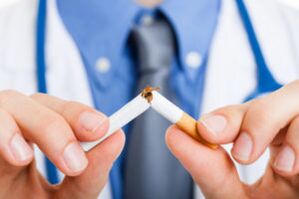
Heavy smokers often face deteriorating health: they notice the appearance of cough with mucus, difficulty breathing, heart failure. In addition, smoking negatively affects the appearance: teeth become yellow, complexion becomes dull, and skin is dry. Therefore, almost every smoker has at least once tried to give up a bad habit.
However, instead of feeling better right away, many people find that they literally hurt everyone after smoking their last cigarette. As a result, the person returns to smoking, choosing, it seems, less evil.
Let’s see why unpleasant symptoms can occur with a sharp rejection of cigarettes? What to do if a person stops smoking but has health problems?
Processes in the body after smoking cessation
Any of the smokers who choose to give up cigarettes must understand that their tobacco addiction is not only psychological but also physiological in nature. Nicotine is literally involved in the body’s metabolism. Therefore, the reason for feeling unwell when quitting smoking is a condition similar to drug withdrawal. The fact that a person, after becoming addicted, began to get sick, suggests that the body is recovering to work without the involvement of nicotine.
In addition, it should be understood that these health problems are temporary and will stop bothering after the adjustment period has passed. In other words, someone who is determined to quit smoking should be patient and just get through this time during which they will encounter unpleasant symptoms.
Bitan!To be honest, it should be noted that not all yesterday's smokers face significant problems. Some have a very strong withdrawal syndrome, while others simply and easily give up cigarettes.
Gastrointestinal tract
Disorder of the gastrointestinal tract is recorded by every other person who has stopped smoking. Most often, in this case, people notice that their stomach hurts, because on the background of refusing cigarettes may appear a decrease in intestinal tone. As a result, increased gas production and constipation are beginning to worry.
No less common is the situation when a person has stopped smoking and got sick. Heartburn often occurs after smoking cessation. The reason for such symptoms is the action of tobacco smoke which, entering the stomach, irritates its walls and causes gastritis.
However, while a person continues to smoke, nicotine to some extent has an antispasmodic effect and reduces pain. When the intake of alkaloids in the body stops, gastric juice with increased acidity levels irritates the mucous membranes, leading to heartburn, nausea and pain.
In addition, if a person has stopped smoking and noticed that his stomach has started to suffer, the reason for this may be a stomach or duodenal ulcer caused during addiction. This is a serious disease that requires the supervision of a gastroenterologist. Therefore, if the patient has stopped smoking and noticed that he has heartburn, nausea and belching, constipation and abdominal pain, he should seek professional help as soon as possible.
Skin problems
Many of yesterday’s smokers notice acne on their face and back after quitting. There are several reasons that explain this phenomenon:
- Changes in vascular tone. During the active action of nicotine on the body, the smoker's skin becomes dry, and the small veins that feed it are in a convulsive state. When you stop smoking, the opposite process can be noticed - an increase in oily skin. The high level of sebum production, on the other hand, is an excellent basis for creating acne;
- If a person stops smoking and has acne, it may indicate a hormonal imbalance, which can also occur in the body on the background of nicotine cessation. It should be borne in mind that smoking cessation is a stress for the body, which can affect all its organs and systems;
- Pimples after smoking can occur due to the banal worsening of acne for the same reason: a stressful situation in which the body finds itself during restructuring into a new way of working;
- Finally, the appearance of skin problems can be explained by the fact that, leaving a bad habit, a person is so exhausted from the struggle with the desire to smoke that he simply does not have the strength to take care of his skin. As a result, acne on the face occurs due to banal violations of hygiene rules, especially if the skin is initially predisposed to the appearance of such problems.

Throat and oral cavity
Common complaints of those who choose to quit smoking are both sore throats and "scratching" in the throat. As an example, consider a situation: a woman stops smoking and notices that her throat has started to hurt. If she could have suffocated such symptoms with a cigarette before, then the smoker will most likely return with cigarettes. In the meantime, it should be understood that sore throat is also a temporary phenomenon, which is caused by the process of airway cleansing or exacerbation of a chronic infection in the background of nicotine rejection.
Another problem of yesterday's smokers is bleeding gums. Sometimes the process is so pronounced that after refusing a cigarette, the teeth hurt and become less durable.
The main reason why a person who decides to quit smoking has bleeding gums, stomatitis or loose teeth is a decrease in immunity on the background of nicotine rejection. A weakened body finds it difficult to resist the gingivitis and caries that arose at the time of tobacco addiction.
Pain in the joints and back, varicose veins
Often, yesterday’s smokers have a feeling of stiffness in the back and joint pain. There seems to be no connection between smoking cessation and the fact that, for example, back pain. However, the appearance of such symptoms can have several explanations at once.
If a person has stopped smoking and his leg hurts, this may indicate the manifestation of so-called drug withdrawal. It's no secret that nicotine acts as a weak drug, so when it stops entering the body, it is quite possible that phantom pain will appear on the body.
Attention!Another explanation for the fact that a smoker has joint pain after quitting a bad habit is the worsening of chronic diseases (arthritis, arthrosis) in a stressful situation for the body. In this regard, if your legs ache after heavy smoking, and the joint pain does not disappear within a few days, you should seek medical help.
Other side effects after smoking cessation
These symptoms are not a complete list of problems a person may face when they decide to get rid of bad habits. Almost all ex-smokers notice weakness, weakness, general weakness in the first days of smoking cessation.

Without cigarettes, addicts become nervous and irritable. It is not surprising that many of them do not pass such a test and soon break down and light a cigarette again.
Period of normalization
However, those who managed to endure the difficult period after quitting smoking soon noticed an improvement in their well-being. The phenomena of so-called withdrawal usually disappear by the end of the first week. Within a month, the work of the gastrointestinal tract and blood vessels is restored. The skin stops being dry and bad breath disappears.
Complete normalization of the condition of most ex-smokers usually occurs no later than six months after complete cessation of smoking.
Conclusion
Despite the fact that it can be very difficult to quit a bad habit, usually none of the people who have quit smoking regret their decision. Smoking really causes significant damage to the body, so when you stop consuming nicotine, people become healthier, feel better and look better.























